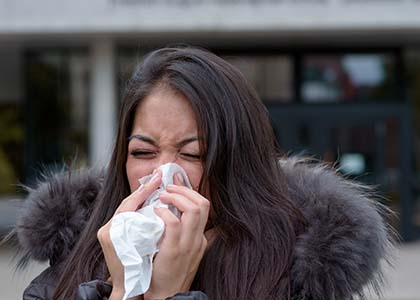
Fight Seasonal Allergies with Food
By Claire Georgiou, Reboot Naturopath, B.HSc ND
Seasonal changes can cause a rise in allergy related disorders due to pollens in spring, ragweed in autumn, moulds in warm humid conditions and animal dander in warmer months. Spring brings lots of pollen from trees, grasses, and weeds which can trigger rhinitis, seasonal allergies, asthma flare-ups and other respiratory and allergic conditions. In the cooler months, asthma can be aggravated when the cool air comes into contact with the airways, the cooler weather also brings with it an increase in infections causing the airways to swell and react.
Think the only answer is anti-histamines, decongestants, corticosteroids and bronchodilators? Well did you know certain foods can help to reduce the severity and duration of those allergic reactions?
Here are some great food additions that can help to reduce those pesky allergies:
Pineapple
Bromelain found in pineapples, particularly the stems can help speed recovery of acute sinusitis. The bromelain content has potent anti-inflammatory and immune-modulating effects in studies thus reducing allergic type reactions and helps to reduce the reaction and improve recovery.
Onions
Onions contain a compound called quercetin, this is thought to help reduce allergic reactions. Other quercetin-rich foods include apples, berries, citrus, cabbage and cauliflower. It is thought that quercetin helps to prevent immune cells from releasing histamines. These have also been studied for their natural anti-asthma effect: ½ a raw onion a day is thought to reduce asthma attacks in study subjects.
Lemons
Lemons and other vitamin C rich foods such as peppers, citrus, strawberries and kiwi fruits may help to reduce the mast cells from releasing excess histamines, the natural chemical that causes the immune system to be over-reactive to environmental factors thus causing allergic reactions.
Garlic
Garlic is famous for helping to reduce the severity and duration of colds but did you know it can also help to reduce allergic reactions? This potent immune stimulator and anti-microbial can help to reduce mucus in the respiratory tract including the sinuses. It is also effective in the reduction of asthma attacks. To aid in the reduction of allergies and infections, consume ½-1 clove per day. Best taken raw to maintain the potency of the allicin content.
Coconut Water Kefir
Coconut water kefir and other fermented foods and probiotic supplements can help to reduce allergic reactions. Studies have been demonstrating that the health of your gut microbe has everything to do with the way you react to allergens in your environment. Pregnant women who have a healthy microbe are more likely to have kids that do not have allergies; studies show that a probiotic can reduce allergies in children by up to 49%.
Turmeric
No surprise here! This amazing spice has potent anti-inflammatory benefits and can reduce the immune system’s overreaction to possible allergens. The more the immune system is supported in a positive way the less the negative reaction will be.
Omega 3 Oils
These can be found in oily cold water fish, flaxseeds, walnuts, hemp seeds and chia seeds. These super unsaturated fatty acids act as an anti-allergic and are responsible for a reduction in any excessive immune reactions.
Green Tea
Compounds such as EGCG that are naturally found in green tea may contain naturally occurring anti-histamines that reduce the severity of allergies and reactions. The EGCG compound works by blocking the production of histamine and immunoglobulin E (IgE).
Horseradish
This is especially helpful for upper respiratory allergies, chronic and acute sinusitis, sinus headaches, common colds and hayfever. Horseradish helps to open up the airways and reduce congestion as can other spices such as mustard, chilli and wasabi.
Increased inflammation in the body creates an environment where the immune system has a tendency to over react to environmental factors. By reducing systemic inflammation with a plant-rich diet you can also help to reduce those excess immune reactions. For more health tips to beat allergies.
Here are some great anti-allergy juice recipes for you to enjoy!
- Pucker-Up Parsley Juice
- Lean Green Pineapple Juice
- Pine-Lime-Lemon Juice
- Hot V6 Juice
- Drink Your Dinner Tonight
- Sweet Pear Turmeric Juice
Special Note: These foods can sometimes cause reactions themselves if someone has a specific food intolerance or allergy. be sure to consult your healthcare practitioner before trying something new.